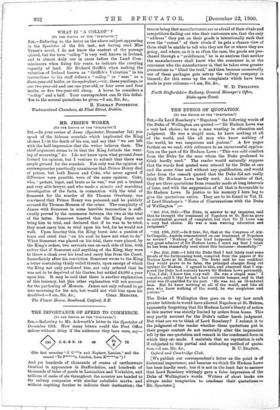THE ETHICS OF QUOTATION. [To THE EDITOR OF THE "SPECTATOR"]
SIR,—In Lord Rosebery's " Napoleon" the following words was the Duke of Wellington are quoted :—" Sir Hudson Lowe was
a very bad choice ; he was a man wanting in education and judgment. He was a stupid man, he knew nothing at all of the world, and like all men who know nothing of the world, he was suspicious and jealous." A few pages further on we read, with reference to an unsuccessful applica- tion on the part of Sir Hudson Lowe : "This was cold comfort from the Duke for the man whom the Duke professed to think hardly used." The reader would naturally suppose that the words first quoted were uttered by the Duke at one and the same time and without any qualification, and would infer from the remark quoted that the Duke did not really think Sir Hudson Lowe hardly used. As a matter of fact, they are three quotations from remarks made at long intervals of time, and with the suppression of all that is favourable to Sir Hudson Lowe. In justice to his memory I here beg to give the quotations entire. They are to be found in VoL of Lord Stanhope's " Notes of Conversations with the Duke of Wellington" :—
" Oct. 31st, 1835 —The Duke, in answer to my inquiries, said that he thought the treatment of Napoleon at St. Helena gave no substantial ground of complaint, but that Sir H. Lowe was a very bad choice. He was a man wanting education and judgment."
"Oct. 19th, 1837.—Is it true, Sir, that at the Congress of Air- la-Chapelle, Austria remonstrated on our treatment of Napoleon as severe P ' Nothing of the kind happened. Without being any great admirer of Sir Hudson Lowe, I must say that I think he has been shamefully used about this business– shamefully.'" " Dec. 21st, 1848.—I told the Duke that I had lately read some proofs of the forthcoming book, compiled from the papers of Sir Hudson Lowe at St. Helena. The Duke said be was confident they would prove to be false, the principal charges flung out against Sir Hudson. I agreed to this, and observed that sup- posed the Duke had scarcely known Sir Hudson Lowe personally.
Yes, I did; I knew him very well He was a stupid man.' I conceive, said I, that he had a bad irritable temper, and in that point was ill-qualified for his post. was not an ill-natured man. But he knew nothing at all of the world, and like all men who know nothing of the world, he was suspicious and jealous.' " The Duke of Wellington then goes on to say how much greater latitude he would have allowed Napoleon at St. Helena, apparently forgetting that Sir Hudson Lowe's liberty of action in this matter was strictly limited by orders from home. This may partly account for the Duke's rather harsh judgment. But what are we to think of Lord Rosebery P I submit it- to the judgment of the reader whether these quotations put in their proper context do not materially alter the impression left by the one quotation and remark in the condensed form in which they ar,3 made. I maintain that no reputation is safe if subjected to this partial and misleading method of quota.
tion.—I am, Sir, &c., R. C. SEATON, Oxford and Cambridge Club.
[We publish our correspondent's letter as the point is of historical importance, and because we think Sir Hudson Lowe has been hardly used; but it is not in the least fair to assume that Lord Rosebery wittingly gave a false impression of the Duke of Wellington's words. Writers of short books are
always under temptation to condense their quotations.— ED. Spectator.]






































 Previous page
Previous page